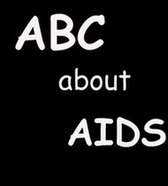 |
|
Editor's Note: China is estimated to have about 740,000 HIV-positive citizens, and about 100,000 AIDS patients among its 1.3 billion people. World AIDS Day this year is all about raising awareness to tackle HIV prejudice and help stop the spread of HIV. This special coverage is to help you know more about HIV/AIDS and find out what you can do to act aware. |
|
Numbers in China |
|
|
AIDS among teens, seniors on the rise in Beijing |
20,000 more AIDS deaths in one year |
|
The number of HIV/AIDS carriers aged over 60 in the capital has been increasing in recent years, an official surnamed Mao from the Beijing Health Bureau revealed on Nov 26, 2010. |
By the end of October, China detected roughly 44,000 new HIV infections this year, with nearly 13 percent infected through gay sex, the latest ministry statistics showed. |
|
To curb the spread of AIDS |
| An intervention program will be expanded to include at least 90 percent of groups considered at high risk of contracting HIV/AIDS by 2015, in a move to reverse the spread of the virus, a leading health official said. |
|
Boost routine testing of drug users to prevent spread of AIDS |
| The spread of HIV and AIDS among millions of people could be slowed if addicts who inject drugs are treated as medical patients rather than as criminals, says the International Federation of the Red Cross. |
| "To legalize same-sex marriage could help stabilize and sustain gay relationships, thereby lowering the risk of contracting HIV/AIDS". |
| From pamphlets to workshops, health authorities across China are trying every conceivable way to spread the word about AIDS and HIV prevention, particularly to rural residents. One of the most successful in the northwest has been a tear-jerking love story performed in qinqiang opera, a style popular in Gansu and Shaanxi provinces and the Ningxia Hui autonomous region. |
| As the number of HIV infection cases shrinks in Guangzhou, the local community is asking for more awareness to be given to members of the gay population who are suffering from AIDS. |
|
Absolute Distance brings you closer to AIDS |
|
An exhibition, named "Absolute Distance", aims at eliminating discrimination surrounding AIDS and reflects the living conditions of patients. The exhibition consists of the creation of 20 artists, who have been living and working with AIDS patients in rural areas of Guangxi Zhuang autonomous region, Yunnan and Shanxi provinces in South, Southwest and North China for nearly one year. |
 |
|
Discrimination against HIV carriers & AIDS patients |
|
Mandatory HIV testing of workers in China should be revoked and the right of people living with HIV (PLWHIV) to employment should be protected, a report released in Beijing on Nov 30, 2010 advocated. |
||
 A volunteer (L) embraces a local resident in Guangzhou, Guangdong province, during an HIV awareness campaign held by the Chi Heng Foundation on Nov 29, 2010. |
HIV job applicant lodges appeal against court ruling |
|
|
HIV-positive still face job discrimination |
|
AIDS patients - ordinary people who need respect and care |
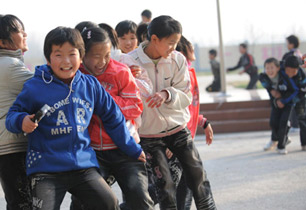 |
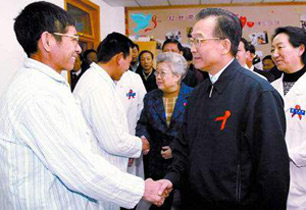 |
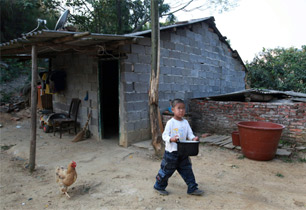 |
|
Orphans cope after loss to AIDS |
A handshake was all it took to transform a life |
No longer forgotten |
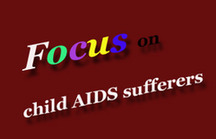 |
To date, China has reported more than 6,000 HIV/AIDS sufferers aged below 15, and about 3,000 of them are already full-blown AIDS patients who need antiviral medications, statistics from the Ministry of Health revealed. |
|
'AIDS is close to you' |
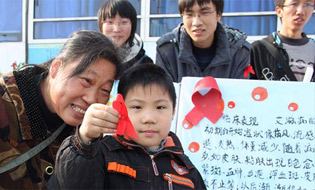 |
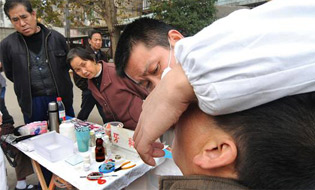 |
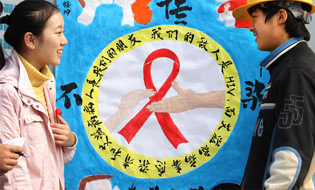 |
|
A child works as a volunteer to promote awareness about AIDS prevention, Zhenjiang, Jiangsu province, Nov 27, 2010. |
A dentist works on the street in Huangshi, Hubei province, Nov 24. Improper disinfection may cause many diseases, including AIDS. |
A volunteer takes part in an AIDS prevention awareness campaign by talking to a worker from a nearby building site, Nantong, Jiangsu province, Nov 28, 2010. |
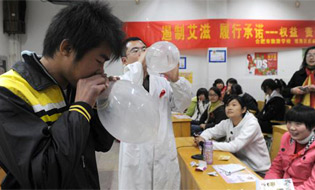 |
 |
 |
|
A staff member from the disease prevention and control bureau of Yaohai District plays games with students in Hefei, Anhui province on Nov 29, 2010. |
Volunteers adorn themselves with red ribbons during an AIDS prevention awareness campaign, in Enshi, Hubei province, Nov 25, 2010. |
University students sign up to show their support for an AIDS prevention awareness campaign, at Hubei University for Nationalities, Enshi, Hubei province, Nov 25, 2010. |
|
World's AIDS awareness campaign |
|
Video |
|
On the 23rd World AIDS Day, two China Daily reporters, Duan Yan and Shan Juan, bring you their cover story. While Duan interviewed a number of sex workers and disease control staff members in Yunnan province, Shan went to Gansu province for a Qin opera that tells a story about AIDS to rural residents. China Daily brings you their stories behind the scenes. [Please click here to watch the video] |
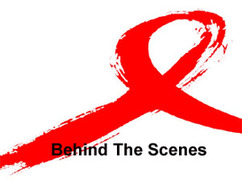 |
|
Comment |
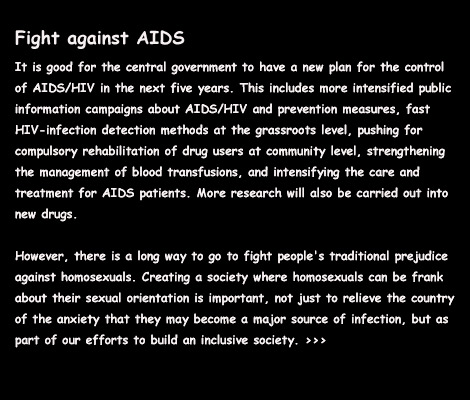 |
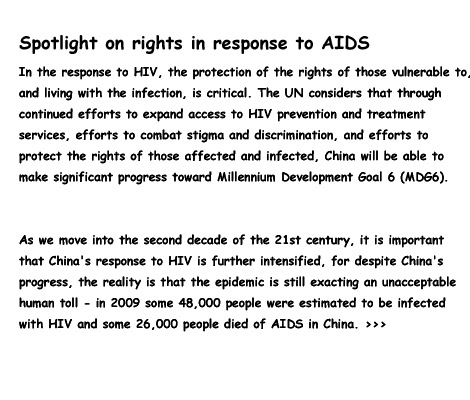 |
|
The outlook |
|
3 big developments make AIDS outlook more hopeful
Three striking developments took place on Nov 23, 2010: UN officials said new HIV cases are dropping dramatically worldwide. A study showed that a daily pill already on pharmacy shelves could help prevent new infections in gay men. And the pope opened the way for the use of condoms to prevent AIDS. "I don't know of a day where so many pieces are beginning to align for HIV prevention and treatment, and frankly with a view to ending the epidemic," said Mitchell Warren, head of the AIDS Vaccine Advocacy Coalition, a nonprofit group that works on HIV prevention research. "This is an incredibly opportune moment and we have to be sure we seize it." [Full story] |
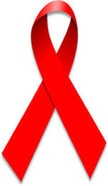 |
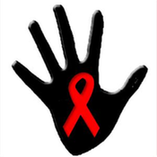 |
Chinese expert seeks to kill HIV with another virus |
